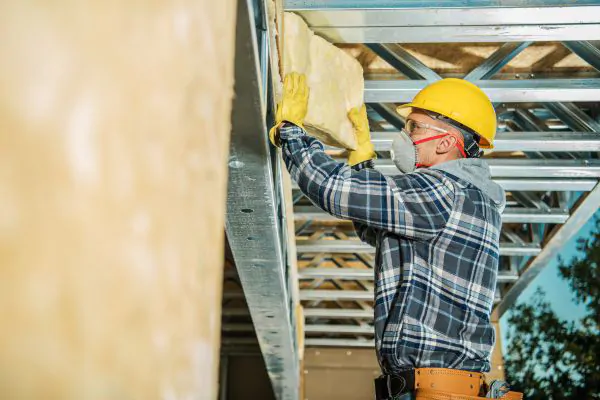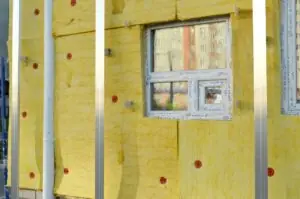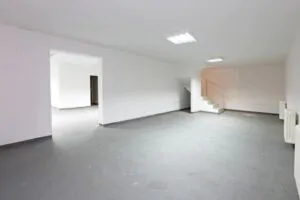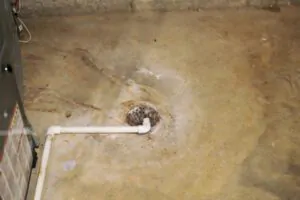With today’s prices, you have to be smart with your money. What’s one thing that could cost you extra money and consume energy resources? A lack of basement wall insulation!
Insulation plays a crucial role in saving energy and money. It helps regulate the temperature inside a home. It also prevents heat from escaping during the winter months and entering during the summer months. Correct insulation can help reduce energy consumption and save money on utility bills.
Do You Insulate Basement Walls?

Importance of Basement Insulation
If you’re like most homeowners, you might not think about the insulation in your basement very often. After all, it’s not a space you use frequently. However, proper basement insulation is just as important as insulating any other part of your home.
Also, it’s important to ensure proper installation of your insulation. This is particularly important in a basement because incorrect installation can lead to gaps or other issues. If you’re not comfortable installing insulation yourself, it’s a good idea to hire a professional to ensure it’s done correctly.
Where to Find a Company that Would Insulate Basements?

If you happen to live in the fine community of Newton, MA, or near the surrounding area, you should know that Newton Basement Finishers is the top company in the industry. We’ve been renovating, remodeling, designing, and customizing basements for years now.
Benefits of Basement Insulation

There are a number of benefits to insulating your basement. For starters, insulation can assist in regulating the temperature in your home, making it more comfortable year-round, which can help reduce your energy bills and save you money in the long run. Insulation can also help reduce noise pollution, making it a great addition to a home theater or music room.
Factors to Consider Before Insulating
Before you begin insulating your basement, there are a few factors you should consider. First, you’ll need to choose what type of insulation to use. Fiberglass batts and spray foam are two common options, but there are other choices as well. You’ll also need to consider the R-value of your insulation, which indicates how well it resists heat flow. A higher R-value means better insulation.
Moisture is something else to keep in mind when insulating your basement. Basements are often damp, which can lead to mold growth and other issues. Before insulating, make sure to address any moisture problems. This might involve sealing any cracks in your foundation, installing a sump pump, or improving ventilation.
Related Article: What Does it Cost to Finish a Basement in 2023?
Best Insulation for Basement Walls

Types of Basement Insulation – Pros and Cons of Each Type
If you’re thinking about insulating your basement walls, you might be wondering which type of insulation is best. There are several different types of insulation, each with its own pros and cons. Here’s a rundown of the most common types of basement insulation and what you need to know about each one.
Fiberglass batts are a popular type of insulation for basement walls. They’re affordable, easy to install, and widely available. However, they’re not as effective as some other types of insulation, and they can be prone to mold growth if they get wet.
Spray foam insulation is also a popular option for basement walls. It’s more expensive than fiberglass batts, but it’s also more effective at reducing energy loss. It can also help prevent moisture problems and improve indoor air quality. However, it can be more difficult to install than other types of insulation, and it requires professional installation.
Rigid foam insulation is insulation that comes in rigid panels. It’s effective at reducing energy loss and preventing moisture problems, but it can be more expensive than other types of insulation. It also requires careful installation to ensure it’s properly sealed and effective.
What to Consider When Choosing the Best Insulation for Your Basement Walls
When choosing the best insulation for your basement walls, remember that there are several factors to consider. First, consider your budget and how much you’re willing to spend. You’ll also want to consider the R-value of your insulation, which indicates how well it resists heat flow. A higher R-value means better insulation.
Also, as mentioned, moisture is another important factor to consider. If your basement is prone to moisture problems, you’ll want to choose an insulation type that can help prevent mold growth and other issues.
Finally, consider the installation process. If you’re comfortable installing insulation yourself, you might opt for a DIY-friendly option like fiberglass batts. However, if you want to ensure proper installation and maximum effectiveness, it’s a good idea to hire a professional insulation installer.
Insulating a Basement: How to Insulate Basement Walls Properly

Insulating your basement walls is a great way cut down your energy use and make your home more comfortable. Here’s a step-by-step guide on how to insulate basement walls properly:
Choose the right insulation. There are several types of insulation available, including fiberglass batts, spray foam, and rigid foam. Remember to consider factors like budget, R-value, and moisture resistance when choosing the best insulation for your basement.
Clear the walls. Before installing insulation, clear the walls of any debris or obstructions. This might include removing any existing insulation, as well as any shelves, hooks, or other objects on the walls.
Seal any cracks or gaps. Use caulk or expanding foam to seal any cracks or gaps in your basement walls. This will help prevent air leakage and improve the effectiveness of your insulation.
Install a vapor barrier. If your basement is prone to moisture problems, consider installing a vapor barrier before installing insulation. This will help prevent mold growth and other issues.
Install the insulation. Follow the manufacturer’s instructions to install the insulation. Be sure to wear protective gear like gloves and a mask, and be careful not to leave any gaps or areas without insulation.
Finish the walls. Once the insulation is installed, you can finish the walls with drywall or other materials. This will help improve the appearance of your basement while also providing additional insulation.
By following these steps, you can insulate your basement walls properly and enjoy the benefits of a more comfortable, energy-efficient home. And if you’re not comfortable doing the work yourself, don’t hesitate to hire a professional to ensure it’s done correctly.
If you’re ready to have a professional take a look at your basement and decide whether insulation is a good idea for you, give us a call at 617-744-4133!






